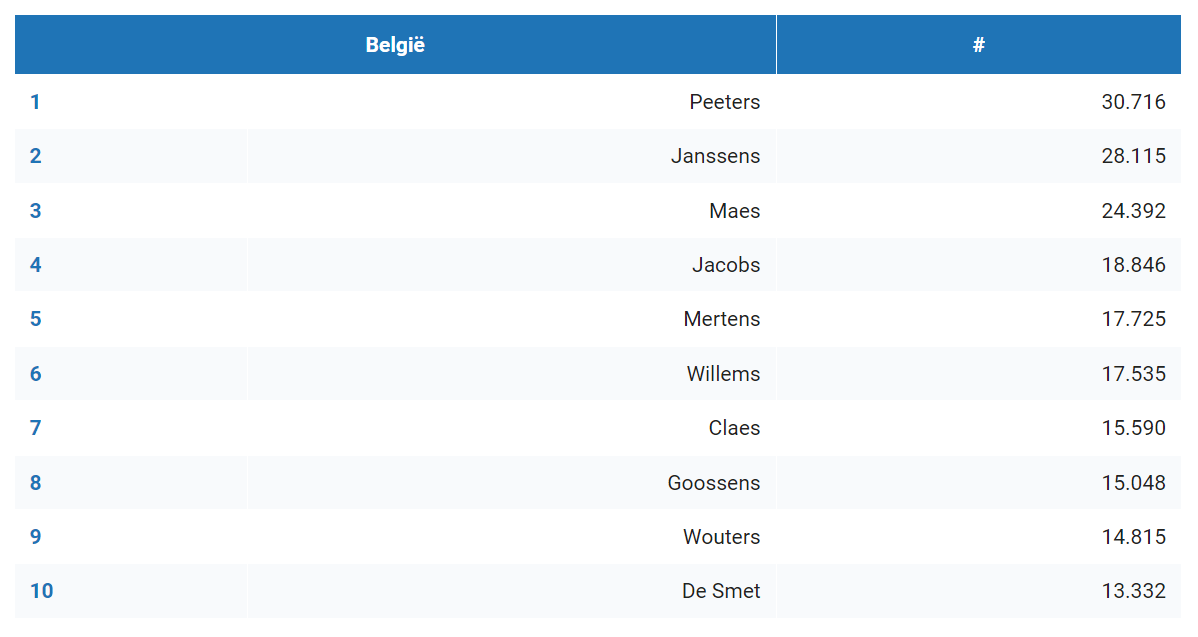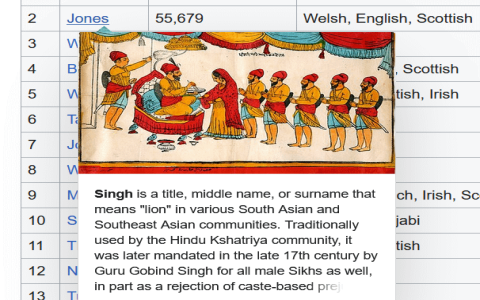# INTRODUCTION
Belgium is famously diverse, not just in its culture but even in the surnames you hear along its cobbled streets. Have you ever wondered what the most common Belgian surnames actually are and what secrets they reveal? This article digs deep into the origins, trends, and meanings behind Belgium’s top last names. Whether you’re curious about your own Belgian roots or just love a good genealogical mystery, read on for expert insights and hands-on tips.
# WHAT ARE THE MOST COMMON BELGIAN SURNAMES?
Let’s get straight to the point: The most common Belgian surnames often reflect centuries of linguistic and cultural history. According to Statbel, Belgium’s official statistics office, names like Peeters, Janssens, Maes, and Jacobs repeatedly top the charts. In 2022, Peeters stood tall as the most prevalent surname, with over 30,000 bearers nationwide (来源: [Statbel, Official Belgian Statistics](https://statbel.fgov.be/en/themes/population/names)).
But what does this mean? Exploring the intricate mix of Flemish, Walloon, and immigrant influences reveals much about Belgium’s social tapestry. Interestingly, many Belgian surnames stem from patronymic, occupational, or locational roots—think “son of Jan,” “the farmer,” or “from the woods.”
# LSI KEYWORDS AND BELGIAN SURNAME VARIANTS
Before we go further, here are some closely related topics people search for:
– Belgian surname origins
– Popular Northern Belgian names
– Walloon family names
– Genealogy in Belgium
– Name distribution Belgium
Each of these points overlaps, painting a broader picture of how Belgians are named and traced through history.
# COMPARISON OF FLEMISH VS. WALLOON SURNAMES
Belgium is split linguistically: Flemish (Dutch-speaking north) and Walloon (French-speaking south). This divide is visible in the surname landscape. Here’s a quick side-by-side:
| Aspect | Flemish Surnames | Walloon Surnames |
|---|---|---|
| Most Common Example | Peeters | Dubois |
| Linguistic Root | Dutch/Low German | French/Walloon |
| Typical Origin | Patronymic or Occupational | Locational or Descriptive |
| Modern Prevalence (2022) | 30,128 (Peeters) | 16,110 (Dubois) |
| Related Regional Variants | Janssens, Maes | Lambert, Simon |
# STEP-BY-STEP GUIDE: HOW TO RESEARCH YOUR BELGIAN SURNAME
Curious to find the backstory of your Belgian surname? Here’s how to start:
1. Start by identifying the exact spelling and any known regional variations. Many Flemish names have alternative forms.
2. Visit official databases like Statbel or Belgian genealogical websites that track surname distribution and history.
3. Analyze the root: Is it occupational, locational, patronymic, or descriptive? This can narrow down the region and possible origin.

4. Consult historical records, birth or marriage certificates, and municipal archives. Belgium’s local town halls usually keep meticulous registries.
5. Connect with online surname forums or Belgian heritage groups. Sharing stories can often reveal family lore or migration clues.
According to my experience researching European surnames, collaborating with local historians or joining a Belgian family association significantly boosts your results.
# WHY DO SOME SURNAMES DOMINATE IN BELGIUM?
If you’re asking why Peeters or Dubois are everywhere, blame history. Surnames in Belgium often began as simple identifiers. As trades (like ‘Bakker’) or first names (like ‘Jan’) became standardized into surnames during Napoleon’s reforms, certain names proliferated fast. Plus, Belgian society stayed localized for centuries, making some names hyper-regional.
It’s especially interesting that in Flanders, patronymics (like “Peeters,” meaning “son of Peter”) naturally became more common, while in Wallonia, locational surnames (like “Dubois,” meaning “from the woods”) spread differently. Demographic data, like birth rates and migration, also fuel these surname concentrations.
# COMMON MISCONCEPTIONS ABOUT BELGIAN SURNAMES
Here are some frequent misunderstandings people face:
– THINKING EVERY PEETERS FAMILY IS RELATED: Not necessarily true. Because patronymic names originated from first names, countless unrelated families share the surname.
– CONFUSING FLEMISH AND WALLOON NAMES: It’s easy to mix them up, but pronunciation and spelling nearly always hint at the region.
– ASSUMING A NAME IS “RARE” JUST BECAUSE IT SOUNDS FOREIGN: Belgium’s population is now highly multicultural, so newer immigrant surnames are rising in frequency.
# REAL DATA REVEALING SURNAME DIVERSITY
Recent research from the Universiteit Gent found that the top 10 surnames account for only 3% of the Belgian population (来源: [UGent Onomastic Studies](https://research.ugent.be/)), which surprises many. This means there’s huge surname diversity beneath the usual top names, reflecting the country’s complex migration patterns and social history.
# ATTENTION: COMMON MISTAKES TO AVOID
Many make errors when tracing Belgian surnames. Spot these early!
– MISTRANSLATING NAMES: Be cautious! Maes is not always “main”; sometimes it’s local to Limburg.
– SKIPPING VARIANT SPELLINGS: Belgian surnames can have 3-5 regional spellings.
– IGNORING FEMALE NAME VARIANTS: Unlike France, some regions retain unique female surname endings.
# CHECKLIST: MASTERING BELGIAN SURNAME RESEARCH
– Confirm your surname’s spelling and regional variant.
– Consult Statbel or other official databases for prevalence data.
– Determine if your name is patronymic, occupational, or locational.
– Access birth, marriage, or municipal records for genealogical leads.
– Cross-reference forum stories and expert opinions for hidden clues.
– Study local history for changes in surname usage over time.
– Watch out for translation errors and variant spellings.
– Connect with Belgian heritage groups to exchange research tips.
– Document everything for future family reference.
– Stay curious—new research reveals trends every year!
# CONCLUSION
The world of Belgian surnames is anything but static. Whether you’re chasing Peeters, Dubois, or something more mysterious, delving into the most common Belgian surnames reveals stories of migration, culture, and deep family roots. With solid research, expert resources, and an eye for detail, you can unlock the power and history behind your Belgian family name—even if it isn’t famous today.













